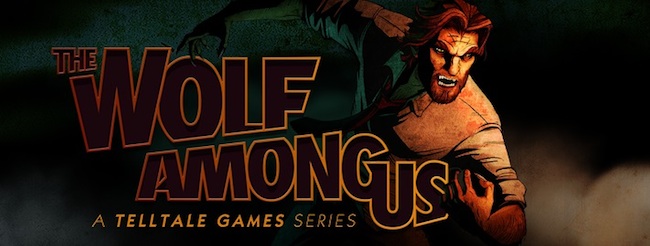
Ever heard of a Vertigo comic books series Fables? Chances are many of you probably haven’t, and that’s not unexpected, despite the fact it’s a critically acclaimed series. Simply put, comic books just aren’t for everyone, but if the film industry has taught us anything in the past 10 years, it’s that people really enjoy the fiction of these incredibly imaginative universes. In fact, the games industry managed to take it even further last year when Telltale Games introduced us all to an episodic series called The Walking Dead. To the surprise of many, this series was a runaway hit, capturing the hearts and attention of millions around the world. Additionally, it then went on to win several Game Of The Year awards, which was a surprise for a title the mainstream wouldn’t consider “AAA”. Naturally, this meant Season 2 was coming, but was it also to be the epitome of Telltales creativity?
The Wolf Among Us would appear to speak otherwise. Based on the aforementioned comic book series, the game puts players into the shoes of Bigby Wolf, the Sherif of Fabletown. No, that name is not just a coincidence; the lead character is actually The Big Bad Wolf, or at least that’s who he used to be once upon a time. Hundreds of years have passed since the Fables were forced to abandon their homes and seek refuge within the “Mundane World”, meaning our world in other words. Naturally, a lot has changed, and whilst many Fables can lead normal lives concealed within regular society; those who don’t look human are either forced to pay for expensive spells to make them appear human, or be taken away to a place called The Farm. Essentially, Bigby’s role in all of this is to ensure the safety of the Fables by keeping the non-human’s hidden, and everyone else from hurting each other.

If I were to leave my description with no further explanation, I’m sure the concept might come across as a bit light hearted. It’s not, so let me clarify. Essentially, The Wolf Among Us explores a noir inspired narrative that would best be described as The Brothers Grim meets Sin City. It’s gritty, violent, and the type of story where Toad from Wind in The Willows is a slum lord and Colin, one of the three little pigs, drinks all the booze and stinks up the apartment because Bigby feels guilty about blowing down his house. Players will spend their days working along side Snow White, and doing their best to keep out of things like Beauty and the Beasts relationship issues. It’s a fantastic concept, and it gets messy. What happens when a young girl turns up dead? Yeah, that’s right. We have a murder mystery on our hands; the first ever recorded in Fabletown, and it’s up to each of you to identify the killer!
As expected, Telltale has utilised a branched narrative approach. This means that the characters will remember what you say, and accordingly act as you progress. It also means that the story can branch off in different directions when decisions are made. It’s a solid formula that worked well for The Walking Dead, and whilst the design application is successful in The Wolf Among Us as well, the new direction will manipulate your emotions in a different way. The aforementioned tasks the player with the care of an 8 year old girl in a post apocalyptic world, so the emotional consequences are a lot more daunting. This time round, it’s often about the thrill of the chase and the shock of the unexpected, which is fantastic, but it does lack the emotional commitment that players may have come to expect. However, this is not a bad thing, it’s just better to set expectations. Overall, it’s a unique experience that is captivating in its own right and doesn’t rely too heavily on the success of what’s come before.

If you’ve ever played a Telltale game before, you’re likely going to go in with a good understanding for how it all works, but essentially, it’s an evolution of the point & click genre. Players will spend their time exploring the environment, interacting with characters and acting out scenarios, so It’s mostly driven from a narrative standpoint and has often been cited as a glorified choose your own adventure book by skeptics. Naturally, this concept will likely appeal to those who are more story inclined, whilst those looking for more typical gameplay mechanics may want to avoid. Fortunately, it’s all pretty well established, so I think people generally understand what it’s going to be, and the truth is; at this point in time, there is not yet a more successful way to tell a story of this type within a game. Additionally, there have been some minor additions, players will now have to position the marker at times to land successful hits, which surprisingly alleviates the design fatigue of the quick time events.
If it’s not clear by now, mechanically, The Wolf Among Us is very similar to every other game developed by Telltale. And so, with each iteration it becomes a little more difficult to review. We discuss the premise and the success of the narrative, which is the most important aspect for this type of experience. However, we are also required to re-evaluate all of the design concepts that once worked well, and determine whether they’re feeling a bit tired. Fortunately, when you have a narrative focused genre, the attention often shifts away from how you’re playing the game, and so the gameplay simply becomes a tool to drive the game forward. Ultimately, the gameplay is going to be a lot less scrutinised as it’s a more redundant aspect of the game, and one that is not as crucial to the overall success. With that said, there must be at least some scale for improvement with each game; and whilst it’s only marginal, I still think Telltale have tweaked enough to deliver what I would consider a more refined experience.

Visually, the engine is starting to show a few signs of age, but that’s not unexpected given it’s multiplatform focus. In time, I would be keen to see a bit of a revamp, but I don’t really think it hurts the experience as the success of the presentation often comes down to how well they can deliver the fantasy of the world they’re working with. Speaking about The Wolf Among Us, in my opinion, it’s probably the best work they’ve done yet. The mix of high fantasy combined with the grit of a noir inspired story really allows the designers to develop a captivating universe. Honestly, every time I peek through that bizarre looking glass that is Fabletown, I simply can’t wait to find out what twisted “fantasy gone wrong” I’ll discover next, and this is something I think other players will also enjoy. Additionally, you can anticipate excellent voice acting and a soundtrack that fits the themes of the story well; it’s not going to blow you away technically, but it’s also unlike anything else you’ve played, or even heard of before.
 A totally bizarre and captivating universe
A totally bizarre and captivating universe Narrative is filled with shocks and thrills
Narrative is filled with shocks and thrills Desicions are provocative and meaningful
Desicions are provocative and meaningful Gritty fantasy breathes life into visuals
Gritty fantasy breathes life into visuals The music/voice acting is as good as ever
The music/voice acting is as good as ever
 Does not ransom your emotions as heavily
Does not ransom your emotions as heavily Honestly, it is a “love it or hate it” design
Honestly, it is a “love it or hate it” design Visuals are starting to look a little dated
Visuals are starting to look a little dated
The Wolf Among Us is an enthralling start to an entirely new series and definitely should not be interpreted as a spin-off in any way. Admittedly, the game borrows the majority of it’s design principles from Telltales predecessor, The Walking Dead, but honestly, it doesn’t ever feel as if you’re playing the same game. The fiction of the Fable series alone should be enough to draw anyone into it’s bizarre world, but the thrill of a noir inspired narrative that allows the player to have meaningful influence on the events of the game is what truly defines the experience. The Wolf Among Us won’t hold players as an emotional hostage the same way that Telltale have done in the past, but the decisions are still going to be difficult, and once again, the player will have a strong influence over life and death as the Sheriff of Fabletown. To conclude, as this is an episodic series, I would recommend that anyone interested make their way to the end of the episode at least. If the overall direction is still a bit unclear right now, the shocking cliff-hanger at the end will set that straight.











